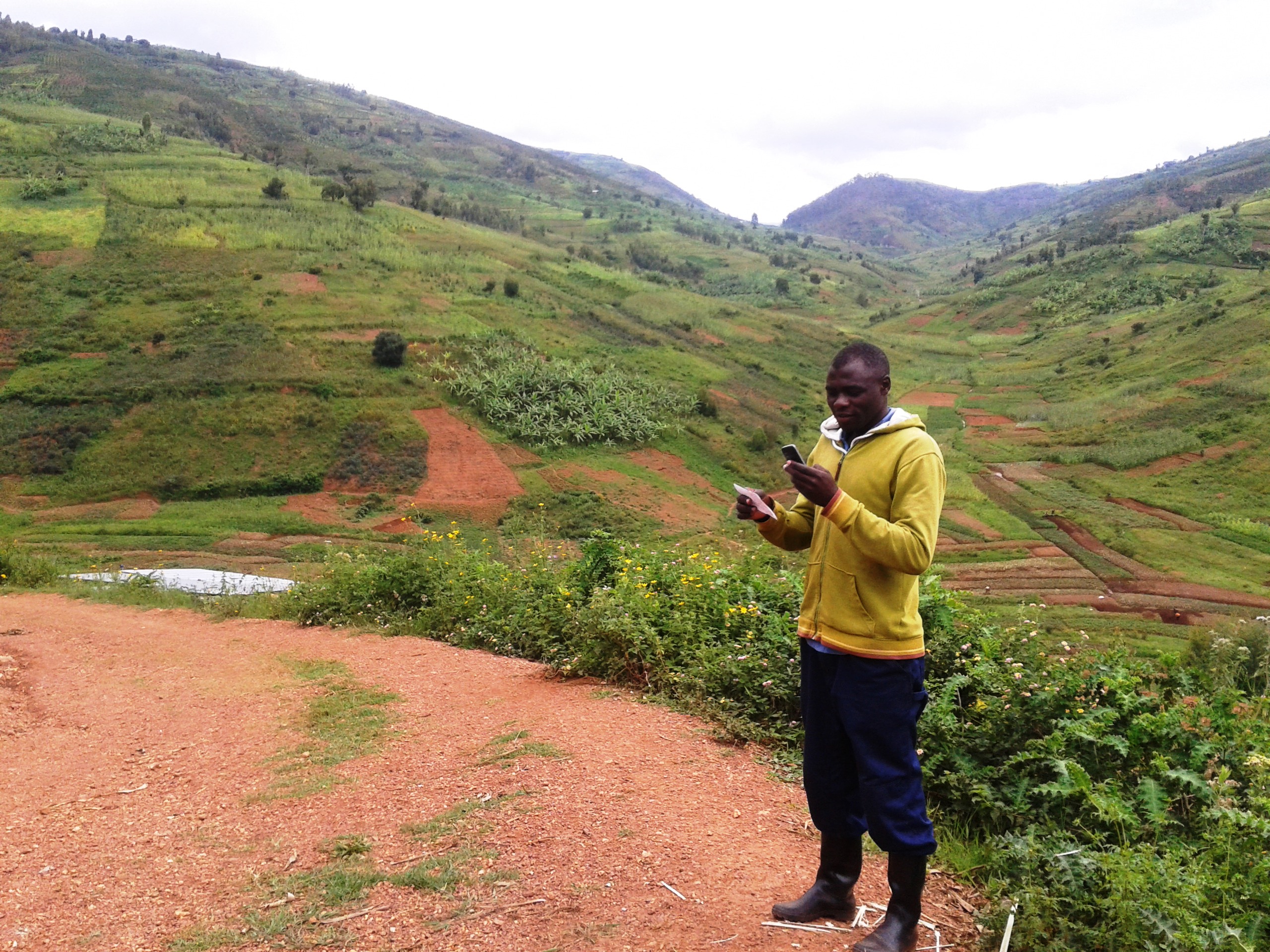
Napoleon Kwizera, production manager at Coffee Villages in Rwanda, the country of a thousand hills.
As we turned the bend and continued down the hill on our way to the Coffee Villages coffee processing station earlier this month, we were greeted by Napoleon Kwizera, his phone raised and face scrunched as he furiously recorded coffee transactions into his phone. He greeted us quickly, distractedly, and indicated that he’d be with us as soon as he was done.
Napoleon is the production manager of Coffee Villages, a private coffee company in Rwanda and one of Root Capital’s first mobile Information and Communication Technology (ICT) pilot clients in Africa. It’s coffee harvest season in Rwanda, and Napoleon and Coffee Villages are busy.
Luckily, our mobile ICT pilot is designed to help ease the burden for organizations like Coffee Villages, allowing them to monitor operations and aid decision making. This simple technology can improve the business and strengthen its financial health — making it a safer bet for our lending.
What is mobile ICT?
As part of Root Capital’s growing efforts to help unlock our clients’ growth, we have been piloting different models of mobile ICT for small and growing businesses in Africa and Latin America. Rural businesses like Coffee Villages are naturally well positioned in the value chain to facilitate flow of key information for different players – from farmers to buyers.
Simply put, ICT includes all mobile technology that systemizes data collection and information management – in our case, for improved business operations. This means that through systems like SMS (texting) on mobile phones, the centralized head offices of an agricultural business can monitor real-time purchases from farmers in an efficient, streamlined way. The way we see it, mobile ICT has the potential to create value for Root Capital, our clients, the smallholder farmers they reach, and value chain partners like global coffee buyers.
What’s in it for agricultural businesses?
In 2013-2014, with the support of the Ford Foundation, Root Capital piloted mobile survey technology with 17 clients to measure farmer poverty levels and verify that our loans in Africa were, in fact, reaching low-income farmers.
Later, when we began conducting ICT diagnostic surveys, we found that many of our clients shared a deep desire and need for timely and accurate farmer and product data to guide decision making. We worked with our clients to co-design ICT pilots that created shared value for our clients and their farmers, rather than just “extracting” data. That “client centric” approach provided us with valuable insights, which we’ve since incorporated across many of our impact assessment channels.
To that end, today a top priority for Root Capital and our clients is digitizing field data collection and facilitating timely analysis for decision-making support. The majority of Root Capital’s clients are currently collecting data from farmers manually, through paper methods that take months to complete and are hardly ever aggregated and analyzed for emerging trends and patterns indicative of performance. We see opportunities for ICT to help our clients monitor buying/harvest season operations, support and build relationships with smallholder farmers, and aid in farm inspection and certification audits – all of which helps our clients make more informed decisions and helps Root Capital manage risk.
Our Rwanda Mobile ICT Pilot
Coffee Villages and the other clients in Root Capital’s mobile ICT pilot in Rwanda are using a system called SMS Bookkeeping to collect data and financial information from their field staff during the coffee buying process. Together with Technoserve, Root Capital has refined the SMS Bookkeeping tool to increase customizability and utility for cooperatives and coffee businesses, allowing them to collect key performance indicators such as production volumes, farm-gate prices, primary operating expenses, and quality grades.
The information they collect is automatically transmitted to Technoserve’s coffee transparency service, a cloud-based website where the data is analyzed and visualized for management staff to use. This information can be analyzed in comparison to production or buying targets for the season, commodity futures prices, and average performance of other farmers and businesses throughout the region.
Rwandan coffee cooperative Musasa is another Root Capital client piloting ICT. During a visit last week, Musasa’s general manager Isaac Nsazamahoro reflected:
“Today, if I’m traveling or if you ask me how the season is doing, I will tell you exactly how many [coffee] cherries are in the warehouse and in the processing centers, and how much more we have to go to meet our targets. And, I do not need to call or have records reconciled because the report is already on my phone and I see it every day. I know that my team is being diligent with the data they send to the system.”
We’ve heard from other SMS Bookkeeping participants like Isaac who tell us that they feel like they’re in a much better position to manage their cash flows and inventories and make informed business decisions. We’re excited by the role ICT can play in helping our clients strengthen their operations, improve efficiency, and cultivate stronger relationships with their farmers, and in the process, help our lending team manage risk and unlock capital for other high-impact businesses around the world.
We’ll be sharing more in the coming months as we expand these important efforts.

What do you think?